The digital marketing landscape is experiencing a fundamental transformation as Large Language Models (LLMs) reshape how users search for information and how search engines deliver results. This shift demands a strategic evolution in SEO practices that goes beyond traditional keyword optimization to embrace:
- Conversational search patterns
- AI-driven material analysis
- Enhanced user experience design
What Is LLM SEO and Why It Matters

LLM SEO represents the optimization strategies specifically designed to improve visibility and performance in AI-powered search environments. As search engines integrate advanced language models into their algorithms, they’re becoming increasingly sophisticated at understanding:
- Context and semantic meaning
- User intent behind queries
- Natural language patterns
- Topic relationships and connections
Recent data from search analytics platforms indicates that conversational queries have increased by 35% over the past 18 months, while traditional keyword-based searches continue to decline. This shift reflects users’ growing comfort with asking questions in natural language, expecting search engines to understand nuanced intent and provide comprehensive answers.
LLM SEO vs Traditional SEO
Traditional SEO focuses on keyword density and exact matches. It relies on technical optimization signals and analyzes individual elements like title tags and meta descriptions. The primary goal is to target specific keywords.
LLM-driven SEO, on the other hand, prioritizes semantic understanding and context. Its goal is comprehensive topic coverage, requiring a holistic evaluation of the material rather than its individual parts. This approach works with topic clusters and the relationships between concepts.
The core difference lies in their evaluation methods. While traditional algorithms analyze individual elements, LLM-powered systems assess content holistically. They understand topic depth, factual accuracy, and how well the material aligns with user intent across multiple related queries.
Key Shifts in User Behavior
Modern search behavior has evolved significantly with AI integration:
- Complex queries: Users ask multi-part questions expecting detailed, conversational responses
- Voice search adoption: 28% of users now prefer voice queries for research-related tasks
- Natural language patterns: Interactions tend to be longer, more specific, and conversational
- Follow-up expectations: Users expect comprehensive coverage within individual pieces
This behavioral shift requires creators to anticipate follow-up questions and provide thorough coverage of topics.
The Impact of LLM on Ranking
LLMs influence ranking through enhanced understanding and user satisfaction metrics. Key ranking factors now include comprehensive topic coverage and authoritative responses that fully answer a user’s question. Search engines also analyze user engagement patterns, such as time spent on a page and scroll depth, as well as return-to-search behavior.
Search engines now better evaluate whether material truly answers user questions, leading to ranking systems that prioritize comprehensive, authoritative responses over keyword-optimized but shallow text.
Core LLM SEO Optimization Techniques
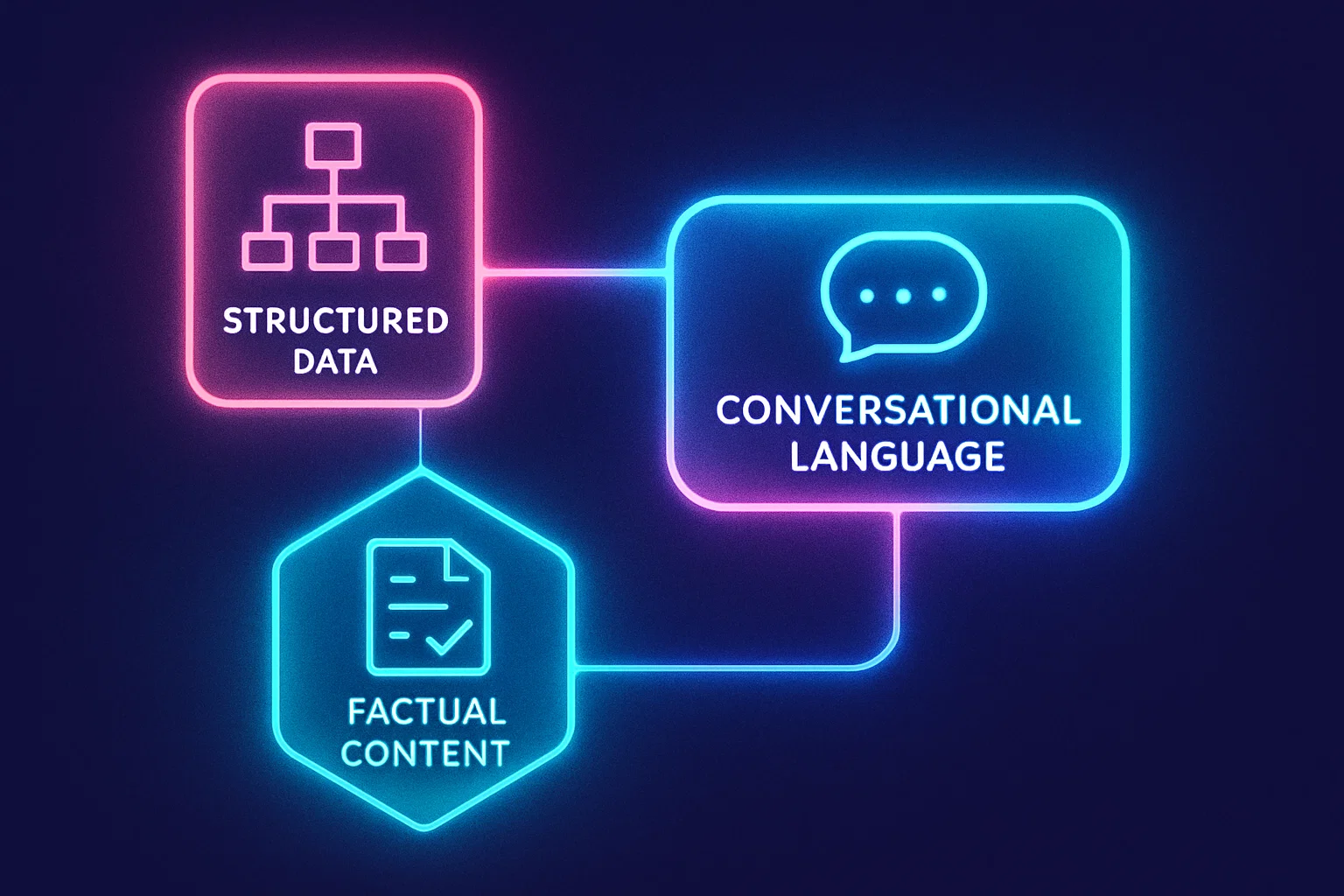
Successful LLM optimization requires a strategic approach that balances technical excellence with material depth and user-focused design.
Quality and Fact-Based Material
LLM SEO demands exceptional quality backed by verifiable facts and authoritative sources. Search engines using language models can better detect:
- Factual inaccuracies and outdated information
- Unsupported claims and unreliable sources
- Shallow or superficial topic coverage
- Missing citations and references
Best practices include:
- Incorporate primary sources and recent studies
- Reference expert insights and case studies
- Provide measurable results and specific examples
- Cite research from recognized institutions
Optimization for Summarization
AI systems often generate summaries and featured snippets from material, making optimization for summarization crucial:
Structure guidelines:
- Use clear topic sentences at paragraph beginnings
- Create descriptive subheadings that work as mini-summaries
- Present key information early in paragraphs
- Include definition-style sentences for important concepts
Example: “Email marketing automation refers to the use of software to send targeted messages based on predefined triggers and user behaviors.”
Using Conversational Queries and Questions
Integrate natural language questions throughout your text to align with conversational search patterns:
- Address common follow-up questions
- Cover related concerns users might have
- Follow natural question progression (basic → advanced)
- Mirror how users actually search and consume information
This approach helps capture long-tail traffic and improves material comprehensiveness.
Structuring Material for Machines
While maintaining readability for humans, structure text to facilitate machine understanding:
Technical requirements:
- Consistent heading hierarchies (H1, H2, H3)
- Clear topic transitions between sections
- Logical information architecture
- Semantic HTML elements for context
Implementation tips:
- Create clear connections between related concepts
- Use transition phrases and contextual linking
- Provide brief explanations for new terms
- Link to comprehensive definitions when needed
Practical Applications of LLMs in SEO
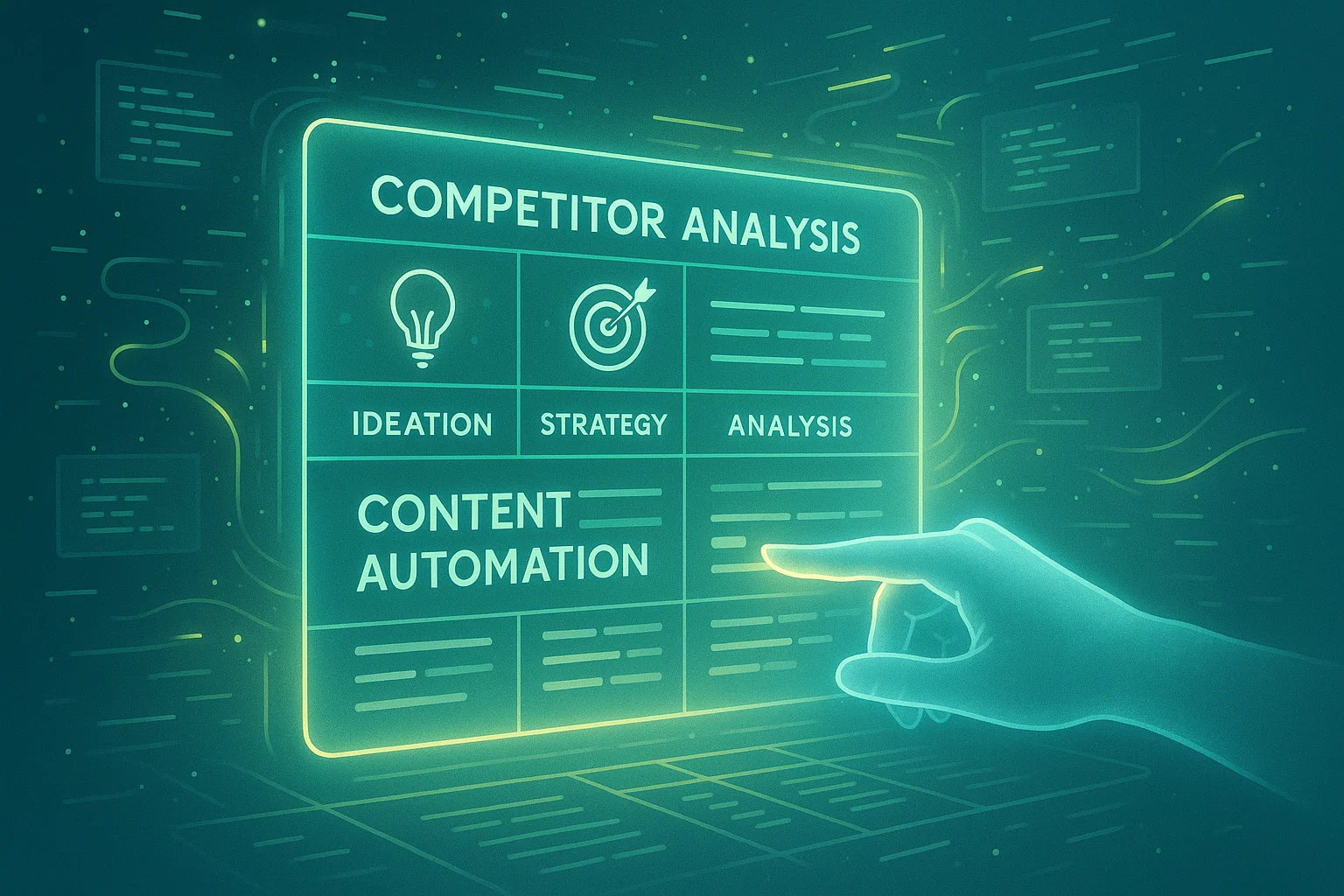
LLM technology offers powerful tools for both optimization and strategic SEO planning.
Using LLMs for Competitor Analysis
LLMs can analyze competitor material at scale, identifying:
- Topic gaps in your strategy
- New angles and approaches
- Optimization opportunities
- Missing subtopics and keywords
Analysis process:
- Evaluate competitor text depth and structure
- Identify user engagement signals
- Discover patterns in successful pieces
- Find common question formats and topics
Automating Text Creation
While maintaining human oversight, LLMs can significantly accelerate creation processes:
Recommended workflow:
- Use AI tools for initial research and outline development
- Generate first drafts with AI assistance
- Apply human expertise for fact-checking
- Ensure brand alignment and strategic optimization
- Add unique insights and domain expertise
Optimizing for Multimodal LLMs
Modern LLMs process multiple formats, including text, images, and video:
Optimization strategies:
- Create descriptive alt text for images
- Add detailed captions and contextual surrounding text
- Combine written explanations with supporting visuals
- Ensure all formats work together to reinforce key messages
Personalizing User Experience
LLMs enable more sophisticated user personalization based on:
- Behavior patterns and search history
- Preferences and interests
- User segment characteristics
- Dynamic adaptation capabilities
Consider creating variations that address different user segments within your target audience while maintaining consistent brand messaging.
Best Practices and Strategies
Implementing effective LLM SEO requires attention to both technical optimization and quality standards.
Implementing Structured Data (Schema Markup)
Schema markup becomes increasingly important as LLMs rely on structured data to understand context:
Key schema types:
- Article markup for blog posts and guides
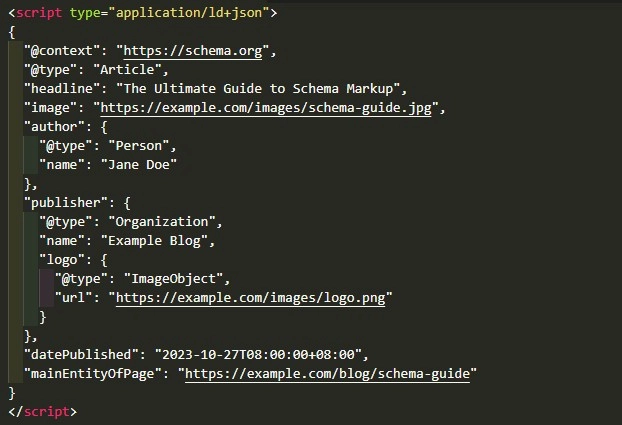
- FAQ markup for question-based material
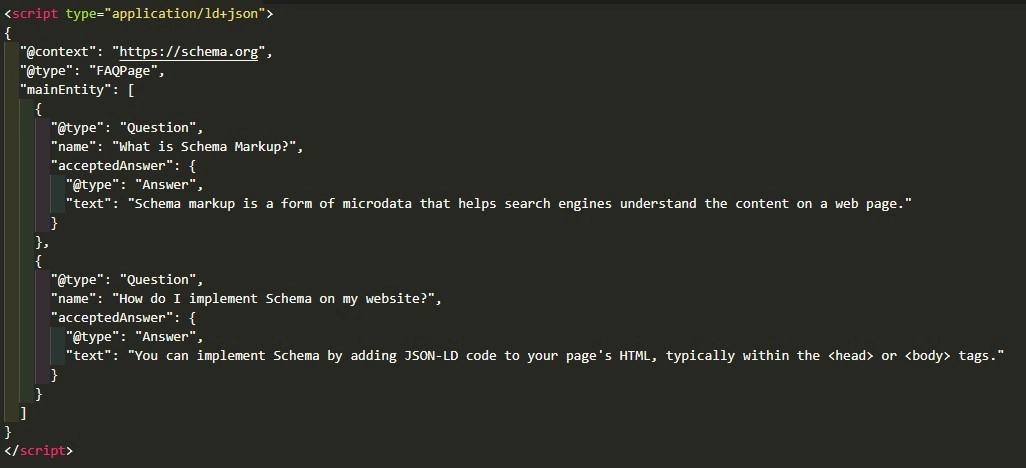
- HowTo markup for instructional pieces
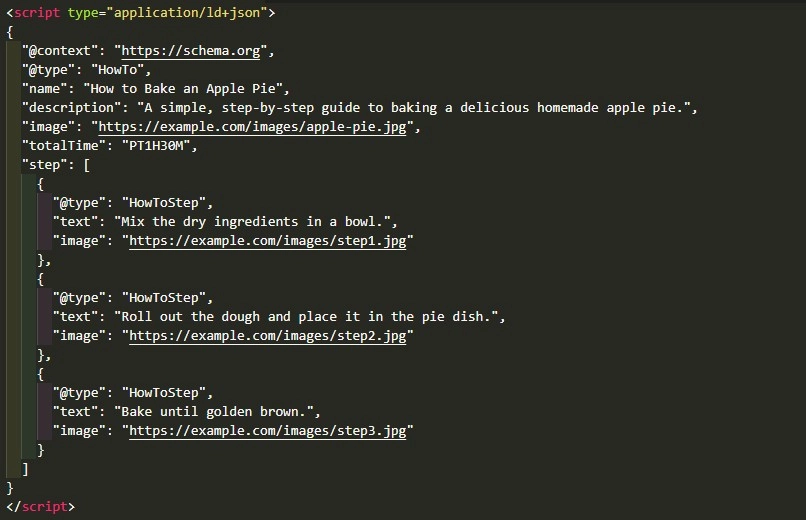
- Organization markup for company information
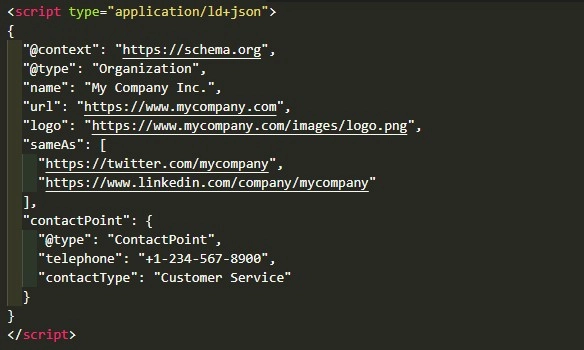
Implementation checklist:
- Ensure accuracy in all structured data
- Match markup with actual text
- Use Google’s Rich Results Test for validation
- Stay current with new schema opportunities
Creating User-Centric Material
Design primarily for user value rather than search engine manipulation:
User-focused approach:
- Solve real user problems
- Provide actionable insights
- Test effectiveness through feedback
- Monitor engagement metrics and conversions
- Refine based on user preferences
High user satisfaction typically correlates with improved LLM SEO performance.
Strengthening E-A-T (Expertise, Authoritativeness, Trustworthiness)
E-A-T becomes even more critical in LLM SEO:
Author credibility elements:
- Clear establishment of author credentials
- Links to professional qualifications
- Published works and industry recognition
- Consistent quality standards across all material
Trust signals include:
- Authoritative source citations
- Comprehensive author profiles
- Professional credentials display
- Industry expertise demonstration
Using Original Data and Research
Original research and proprietary data can significantly boost a website’s authority. This approach offers several key benefits, including enhanced uniqueness, which helps a brand stand out from the competition. It also creates natural link-earning opportunities and helps establish the brand as a thought leader in its industry. Additionally, original content often generates higher engagement on social media platforms.
To make the most of this strategy, there are several best practices to follow. It’s effective to conduct surveys and analyze industry trends to gather unique insights. Compiling case studies with fresh insights and presenting data using a clear methodology are also crucial. For visual appeal and clarity, it’s best to use professional visualization tools. When publishing this kind of content, always explain limitations transparently to maintain credibility and trust with your audience.
Optimizing for Fast Loading
Technical performance remains crucial for LLM SEO success:
Performance priorities:
- Fast-loading pages for better user experience
- Optimized images and minimized code bloat
- CDN leverage for optimal performance
- Regular Core Web Vitals monitoring
Common Mistakes to Avoid
Understanding common LLM SEO pitfalls helps prevent strategies that may have worked in traditional SEO but prove counterproductive in AI-powered search environments.
Keyword Stuffing
Why it fails with LLMs:
- Easy detection of unnatural keyword usage
- Potential penalties for prioritizing density over readability
- Reduced value compared to semantic relevance
Better approach:
- Use natural language patterns
- Implement synonyms and related terms
- Focus on natural variations people actually use
- Prioritize readability and user experience
Outdated Material
LLM preferences:
- Fresh, current information over outdated statistics
- Recent best practices and examples
- Updated data points and research findings
Maintenance requirements:
- Establish regular update schedules
- Refresh examples and case studies
- Revise recommendations based on industry evolution
- Monitor information accuracy continuously
Neglecting Schema
Consequences of missing structured data:
- Limited LLM understanding of text
- Missed featured snippet opportunities
- Reduced knowledge panel appearances
- Poor categorization accuracy
Solutions:
- Regular schema markup audits
- Stay current with new structured data opportunities
- Use validation tools (Google’s Rich Results Test)
- Ensure markup accuracy and completeness
Lack of Human Expertise
Over-relying on AI-generated content without human expertise review can result in factual errors, brand misalignment, and missed strategic opportunities. Maintain human oversight throughout the content creation and optimization process.
Ensure subject matter experts review AI-generated content for accuracy, brand voice consistency, and strategic alignment. Human expertise adds the nuanced understanding and credibility that purely automated approaches cannot provide.
Tools for LLM SEO
Effective LLM SEO requires specialized tools that can analyze AI-powered search results, generate optimized content, and track performance in evolving search environments.
Analysis Tools
Advanced SEO platforms now offer LLM-specific analysis features including conversational query tracking, AI-generated snippet monitoring, and semantic search performance metrics. These tools help identify optimization opportunities and track progress in AI-powered search results.
Popular analysis tools include SEMrush’s AI-powered content gap analysis, Ahrefs’ conversational search tracking, and specialized LLM SEO platforms that monitor AI-generated search results and featured snippet performance across different query types.
Generation Tools
AI-powered content generation tools can significantly accelerate content creation when used properly. Tools like GPT-4, Claude, and specialized SEO writing assistants help generate initial drafts, research outlines, and optimization suggestions based on current best practices.
Use generation tools strategically for research, ideation, and initial content development while maintaining human oversight for fact-checking, brand alignment, and strategic optimization decisions.
Useful Plugins
WordPress and other content management systems offer plugins specifically designed for LLM SEO optimization. These tools automate schema markup implementation, suggest content improvements, and monitor performance metrics relevant to AI-powered search.
Popular plugins include RankMath for comprehensive SEO optimization, Schema Pro for advanced structured data implementation, and specialized LLM SEO tools that focus on conversational search optimization and AI-friendly content formatting.
Bing Webmaster Tools
Microsoft’s Bing Webmaster Tools provide valuable insights into AI-powered search performance, including data from Bing Chat and other AI-integrated search features. These insights help optimize for the growing ecosystem of AI-powered search experiences.
Bing’s tools offer unique perspectives on LLM SEO performance, including how content performs in conversational search scenarios and AI-generated response inclusion rates.
Frequently Asked Questions
LLM SEO refers to search engine optimization strategies specifically designed for AI-powered search environments that use Large Language Models. These techniques focus on creating content that performs well when evaluated by AI systems that understand natural language, context, and user intent rather than relying solely on traditional keyword matching.
LLM SEO emphasizes semantic understanding, conversational content, and comprehensive topic coverage rather than keyword density and exact matches. While traditional SEO focuses on technical optimization signals, LLM SEO prioritizes content quality, factual accuracy, and natural language patterns that align with how AI systems process and evaluate information.
Measure LLM SEO success through conversational query rankings, AI-generated snippet inclusions, user engagement metrics, and performance in voice search results. Track featured snippet appearances, answer box inclusions, and performance for long-tail, question-based queries that reflect natural language search patterns.
LLM SEO importance will continue growing as AI integration in search engines expands. Users increasingly expect conversational, comprehensive answers rather than simple link lists. Businesses that optimize for LLM-powered search now will maintain competitive advantages as these technologies become standard across all major search platforms.

